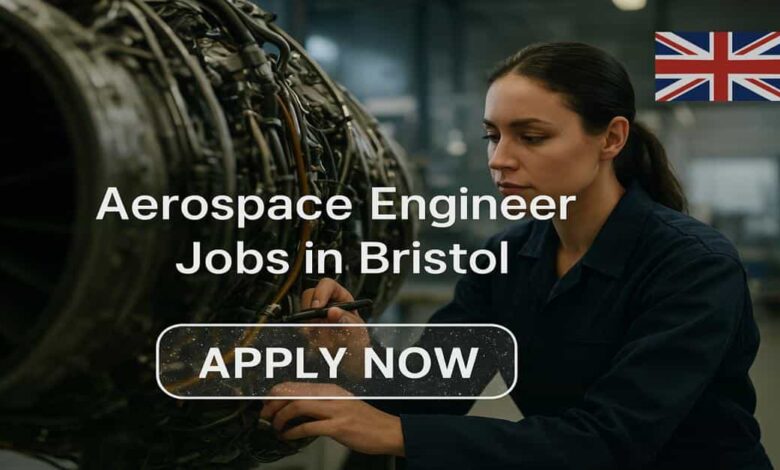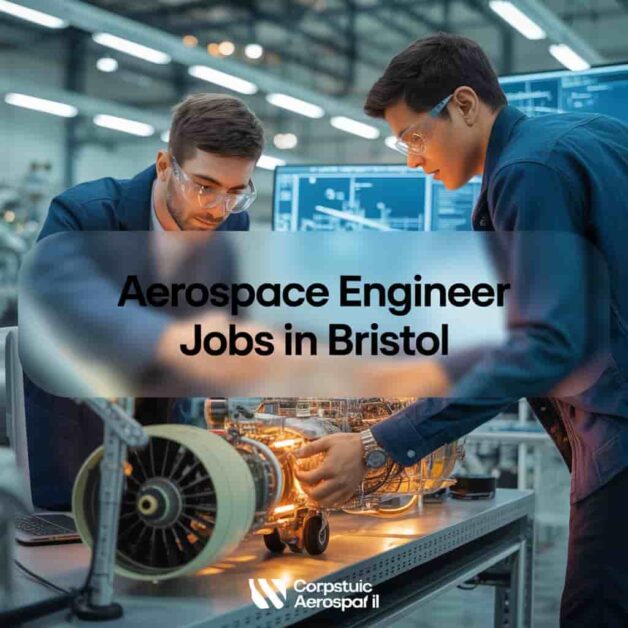Aerospace Engineer Jobs in Bristol 2026 – Start Now

Aerodynamics engineers, avionics specialists, systems engineers, and manufacturing experts in Bristol can expect salaries ranging from £28000 to £80000 per year, depending on experience. Most roles are full-time and require working on-site to collaborate on advanced aerospace projects, though some positions may offer hybrid options.
Entry-level candidates can find graduate programs to launch their careers, while seasoned professionals are in demand for leading-edge initiatives.
Why Bristol is a Hotspot for Aerospace Engineering Jobs?
Bristol’s aerospace industry is a powerhouse, contributing significantly to the UK’s economy. The city hosts the largest aerospace cluster in Europe, with companies driving advancements in aircraft design, propulsion systems, and sustainable aviation technologies. In 2026, Bristol’s aerospace sector is poised for growth due to:
- Innovation in Sustainable Aviation: Companies are investing in eco-friendly technologies like hydrogen-powered aircraft and electric propulsion systems.
- Major Projects: Airbus’s A350 and A320neo programs, along with Rolls-Royce’s engine development, are creating hundreds of jobs.
- Skilled Workforce Demand: Employers seek engineers with expertise in aerodynamics, avionics, and systems integration.
With a robust pipeline of projects, Bristol is the ideal location for aerospace engineers looking to make an impact.
Job Roles:
The aerospace industry in Bristol offers a variety of roles catering to different specializations. Here are some of the most in-demand aerospace engineering jobs in 2026:
1. Aerodynamics Engineer
Aerodynamics engineers design and test aircraft components to optimize performance and fuel efficiency. In Bristol, companies like Airbus are hiring for roles focused on next-generation aircraft.
- Key Skills: CFD (Computational Fluid Dynamics), wind tunnel testing, MATLAB.
- Salary Range: £35,000–£60,000 per year, depending on experience.
2. Avionics Engineer
Avionics engineers develop and maintain electronic systems for aircraft navigation and communication. Bristol’s aerospace firms are seeking talent for cutting-edge avionics projects.
- Key Skills: Embedded systems, software development (C++, Python), avionics certification.
- Salary Range: £40,000–£70,000 per year.
3. Systems Engineer
Systems engineers oversee the integration of complex aircraft systems, ensuring seamless operation. This role is critical for projects like Airbus’s ZEROe hydrogen aircraft.
- Key Skills: Systems integration, requirements management, DO-178C standards.
- Salary Range: £45,000–£80,000 per year.
4. Manufacturing Engineer
Manufacturing engineers focus on optimizing production processes for aerospace components. Bristol’s GKN Aerospace is a leader in this space, offering roles in advanced manufacturing.
- Key Skills: Lean manufacturing, CAD/CAM software, automation.
- Salary Range: £38,000–£65,000 per year.
Check Also: Airline Pilot Jobs in London
5. Graduate Aerospace Engineer
For those just starting, Bristol offers entry-level roles with training programs at companies like Rolls-Royce and BAE Systems.
- Key Skills: Degree in aerospace engineering or related field, problem-solving, teamwork.
- Salary Range: £28,000–£35,000 per year.
Hiring Companies:
Several leading companies are actively recruiting aerospace engineers in Bristol. Here are the top employers to watch:
- Airbus: Known for commercial aircraft and sustainable aviation projects.
- Rolls-Royce: Specializes in propulsion systems and engine manufacturing.
- GKN Aerospace: Focuses on aerostructures and advanced materials.
- BAE Systems: Offers roles in defense and aerospace systems integration.
- Leonardo: Hiring for helicopter and electronics divisions.
Visit their official career pages or follow their LinkedIn profiles for the latest job postings.

Skills and Qualifications for Aerospace Engineer Jobs in Bristol:
To succeed in Bristol’s aerospace industry, you’ll need a mix of technical and soft skills. Employers prioritize:
- Technical Skills: Proficiency in CAD software, simulation tools (ANSYS, MATLAB), and knowledge of aerospace standards (e.g., AS9100).
- Soft Skills: Problem-solving, teamwork, and communication for collaborative projects.
- Qualifications: A degree in aerospace engineering, mechanical engineering, or a related field. Postgraduate degrees or certifications in specialized areas (e.g., avionics, composites) are a plus.
Benefits of Aerospace Engineer Jobs in Bristol:
- Competitive Salaries
Aerospace engineers in Bristol earn between £28,000 to £80,000 per year depending on experience. These salaries are among the highest in the UK’s engineering sector, rewarding both entry-level and senior professionals. - Career Growth Opportunities
With major projects from Airbus, Rolls-Royce, and GKN Aerospace, Bristol provides a clear path for career progression. Engineers can move from graduate roles to senior technical or management positions quickly. - Hands-On Experience with Cutting-Edge Technology
Work on sustainable aviation, hydrogen-powered aircraft, and advanced propulsion systems. Bristol’s projects allow engineers to contribute to innovations shaping the future of aerospace. - Skill Development and Training
Companies offer access to professional courses, workshops, and certifications. Engineers can upskill in CAD, avionics, systems integration, and emerging technologies. - Networking and Industry Connections
Engage with top aerospace professionals through fairs, seminars, and professional associations. These connections open doors to new opportunities and collaborations. - Dynamic and Collaborative Work Environment
Teams in Bristol emphasize problem-solving, innovation, and collaboration. Engineers work in an environment that encourages creativity while meeting industry standards. - Location Advantages
Bristol’s vibrant tech and engineering ecosystem makes it easy to access amenities, research centers, and international companies. It’s an ideal city for both work-life balance and professional networking.
How to Land an Aerospace Engineer Jobs in Bristol?
Securing a job in Bristol’s competitive aerospace market requires preparation and strategy. Follow these steps to stand out:
- Tailor Your CV: Highlight relevant skills like CAD software (e.g., CATIA, SolidWorks), programming (Python, MATLAB), and certifications (e.g., Six Sigma, EASA regulations).
- Leverage Networking: Attend industry events like the Bristol Aerospace Careers Fair or join professional groups like the Royal Aeronautical Society.
- Apply Early: Many companies, including Airbus and Rolls-Royce, open applications for 2026 roles in early spring. Check their career portals regularly.
- Upskill: Enroll in short courses on emerging technologies like sustainable aviation or additive manufacturing to boost your employability.
- Use Job Boards: Platforms like Indeed, LinkedIn, and Aviation Job Search frequently list aerospace roles in Bristol.
The Future of Aerospace Engineering:
The aerospace industry in Bristol is evolving rapidly, with a strong focus on sustainability and innovation. expect increased investment in:
- Green Technologies: Hydrogen and electric aircraft are reshaping the industry.
- Digital Transformation: AI and digital twins are streamlining design and manufacturing processes.
- Global Collaboration: Bristol’s companies are partnering with international firms, creating diverse opportunities.
Staying ahead of these trends will give you a competitive edge in the job market.
Conclusion:
Bristol’s aerospace industry is booming, and 2026 is the perfect time to join this dynamic field. With high-demand roles, competitive salaries, and a focus on cutting-edge technologies, there’s no better place for aerospace engineers to thrive. Start by updating your CV, exploring job boards, and connecting with Bristol’s top employers. Your dream aerospace engineering job is waiting apply now and take flight!
Frequently Asked Questions:
-
Is there room for career growth in Bristol’s aerospace industry?
Yes, the city offers strong growth opportunities with large-scale projects and innovation initiatives. Engineers can progress from graduate roles to senior technical or managerial positions.
-
How can I increase my chances of landing a job in Bristol’s aerospace sector?
Tailor your CV, network through industry events, apply early, and take short courses on emerging technologies like sustainable aviation or additive manufacturing.
-
Are aerospace engineering jobs in Bristol full-time or part-time?
Most positions are full-time, requiring on-site collaboration. Some companies may offer hybrid or flexible work options, but physical presence is often essential for hands-on projects.



